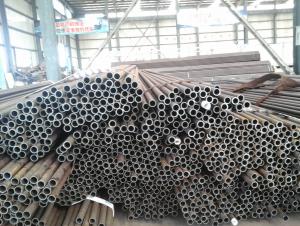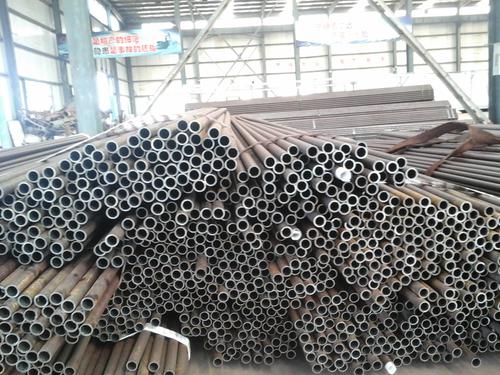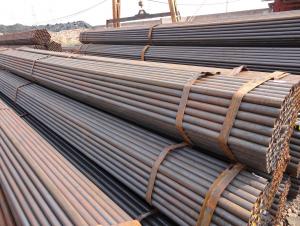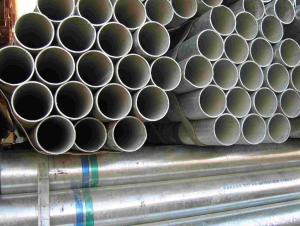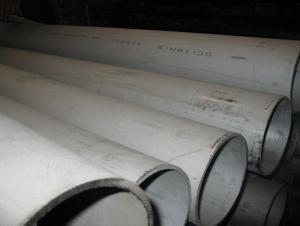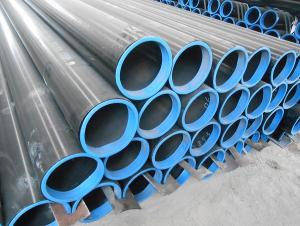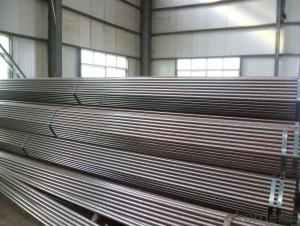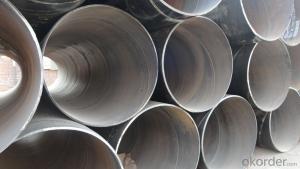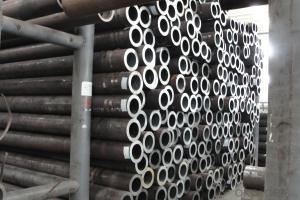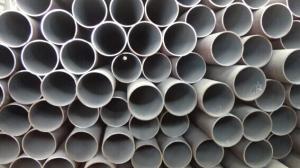Round Hot Rolled Seamless Pipes
- Loading Port:
- Tianjin
- Payment Terms:
- TT or LC
- Min Order Qty:
- -
- Supply Capability:
- 3000吨 m.t./month
OKorder Service Pledge
OKorder Financial Service
You Might Also Like
Structure of Seamless Steel Pipe
Brand | seamless steel pipe |
Material | St35,St45,St52,E215,E235,E355,10,20, A106,A179,A192,A210,T11 |
T22,T12, AISI4130,SAE1010,SAE1020.etc | |
Standard | Meet or exceed ASTM,ASME,API,ANSI and DIN standards. |
ASTM A106/A179/A192/A210/A213/A519 etc. | |
DIN2391/DIN17175/EN10305 etc | |
GB8162/GB8163/GB3639 etc | |
Technique | Cold Drawn/Cold rolled |
Usage | 1. auto and motorcycle steel pipe |
2. Gas spring steel Tube | |
3. Boiler Pipe | |
4. Low and middle pressure fluid transportation pipeline | |
5. Hydraulic system steel tube | |
6. Electric industry |
Application | Cold drawn or cold rolled precision seamless steel tubes for hydraulic pressure and pneumatic services. |
For Auto use,machinery use,oil cylinder tube,motorcycle shock reducer use,auto shock reducer inner cylinder,gas spring use etc. | |
Seamless steel pipes for low and medium pressure boiler, high pressure boiler, ship-building,Liquid service, petroleum cracking, chemical fertilizer equipment,Drawing-oil-equipment and structure purposes. |
Main Features of the Seamless Pipe ASTM A106/53
• High manufacturing accuracy
• High strength
• Small inertia resistance
• Strong heat dissipation ability
• Good visual effect
• Reasonable price
Seamless Pipe ASTM A106/53 Specification:
Standard | GB, DIN, ASTM ASTM A106-2006, ASTM A53-2007 |
Grade | 10#-45#, 16Mn 10#, 20#, 45#, 16Mn |
Thickness | 8 - 33 mm |
Section Shape | Round |
Outer Diameter | 133 - 219 mm |
Place of Origin | Shandong, China (Mainland) |
Secondary Or Not | Non-secondary |
Application | Hydraulic Pipe |
Technique | Cold Drawn |
Certification | API |
Surface Treatment | factory state or painted black |
Special Pipe | API Pipe |
Alloy Or Not | Non-alloy |
Length | 5-12M |
Outer Diameter | 21.3-610mm |
Grade | 20#, 45#, Q345, API J55, API K55, API L80, API N80, API P110, A53B |
Standard | ASME, ASTM |
Packaging & Delivery
Packaging Details: | seaworthy package,bundles wrapped with strong steel strip |
Delivery Detail: | 15-30days after received 30%TT |
Seamless Pipe Image
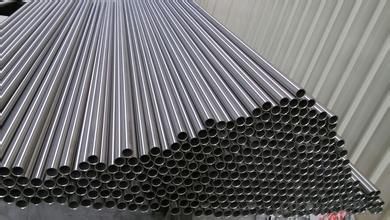
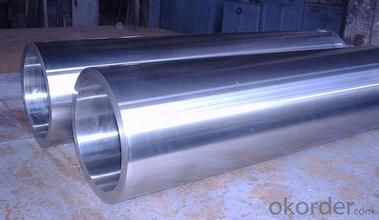
FAQ of Seamless Pipe ASTM A106/53
①How is the quality of your products?
Our products are manufactured strictly according to national and internaional standard, and we take a test
on every pipe before delivered out. If you want see our quality certifications and all kinds of testing report, please just ask us for it.
Guaranteed: If products’ quality don’t accord to discription as we give or the promise before you place order, we promise 100% refund.
②How about price?
Yes, we are factory and be able to give you lowest price below market one, and we have a policy that “ for saving time and absolutely honest business attitude, we quote as lowest as possible for any customer, and discount can be given according to quantity”,if you like bargain and factory price is not low enough as you think, just don’t waste your time.Please trust the quotation we would give you, it is professional one.
③Why should you chose us?
Chose happens because of quality, then price, We can give you both.Additionally, we can also offer professional products inquiry, products knowledge train(for agents), smooth goods delivery, exellent customer solution proposals.Our service formula: good quality+good price+good service=customer’s trust
SGS test is available, customer inspection before shipping is welcome, third party inspection is no problem.
- Q: How do steel pipes perform in high-temperature environments?
- Steel pipes perform well in high-temperature environments due to their excellent heat resistance properties. They can withstand elevated temperatures without losing their structural integrity or strength. Additionally, steel pipes have low thermal expansion, which reduces the risk of deformation or cracking under extreme heat. This makes steel pipes a reliable choice for various applications in industries such as oil and gas, power generation, and chemical processing, where high temperatures are common.
- Q: What are the different types of steel pipe joints for underwater applications?
- There are various types of steel pipe joints commonly used for underwater applications, including buttweld joints, socket weld joints, and threaded joints. These joints provide secure connections and maintain the integrity of the pipeline system in underwater environments.
- Q: Can steel pipes be used for underground water supply?
- Indeed, steel pipes possess the capability to be employed in the provision of underground water. Due to their robustness, durability, and resistance to corrosion, steel pipes prove to be appropriate for a wide range of uses, including underground water supply. Nonetheless, it is imperative to utilize steel pipes that are explicitly manufactured for underground purposes and are furnished with a protective coating or lining to thwart corrosion. Furthermore, the installation and upkeep of these steel pipes must be conducted diligently to guarantee their long-term resilience and effectiveness within an underground water supply system.
- Q: Can steel pipes be used for hydraulic systems?
- Yes, steel pipes can be used for hydraulic systems. Steel pipes are commonly used in hydraulic systems due to their high strength, durability, and ability to handle high pressure. They provide excellent resistance to corrosion and can effectively transport hydraulic fluids, making them a suitable choice for various hydraulic applications.
- Q: What is the difference between galvanized iron pipe and galvanized steel pipe? Or called different, in fact, is referred to as galvanized pipe?
- Just name different, all refers to GB/T 3091-2015 "low pressure fluid transport welding pipe" contained in the galvanized pipe.Galvanized pipe means zinc plated, suitable for water, air, heating, steam and gas and other low pressure fluid conveying straight welded steel pipe, longitudinal submerged arc welding (SAWL) steel pipe and spiral seam submerged arc welding (SAWH) steel pipe.
- Q: How are steel pipes measured and categorized?
- Steel pipes are typically measured and categorized based on their outer diameter, wall thickness, and length. The outer diameter refers to the measurement of the pipe's cross-sectional width, while the wall thickness refers to the thickness of the pipe's walls. These measurements are usually expressed in millimeters or inches. Categorization of steel pipes is done based on their purpose and specifications. The most common categorization is based on the pipe's pressure rating, which determines its ability to withstand different levels of internal or external pressure. Pipes are classified into various pressure classes, such as Schedule 40, Schedule 80, and Schedule 160, among others. The higher the pressure class, the thicker and stronger the pipe. Another way to categorize steel pipes is based on their manufacturing process and material composition. For example, seamless steel pipes are produced through a process that involves piercing a solid bar of steel to form a hollow tube, while welded steel pipes are made by rolling and welding a flat steel sheet or strip into a cylindrical shape. Additionally, steel pipes can be categorized based on their material composition, such as carbon steel pipes, stainless steel pipes, or alloy steel pipes. Steel pipes are also categorized based on their end connections or fittings. Common types of pipe ends include threaded ends, which are suitable for screwing fittings onto the pipe, and plain ends, which are typically used for welding or flanging connections. Overall, the measurement and categorization of steel pipes play a crucial role in ensuring their proper selection and usage in various industries, such as construction, oil and gas, plumbing, and manufacturing.
- Q: How are steel pipes used in the manufacturing of boilers?
- Due to their strength, durability, and heat-resistant properties, steel pipes are essential components in the manufacturing of boilers. Boilers are utilized in various industrial and commercial applications to generate steam or heat water. The construction of boiler tubes is where steel pipes are primarily employed, as they function as the main heat transfer medium. Considering the high temperatures and pressure that these tubes are subjected to, it is crucial to use a material that can withstand such extreme conditions. Steel, with its excellent mechanical properties and corrosion resistance, is the ideal choice for this purpose. To create the boiler tubes, the manufacturing process involves shaping and sizing the steel pipes accordingly. These tubes are then connected to form a network of channels through which hot gases or water can flow. Depending on the boiler design requirements, the steel pipes utilized in this process are often seamless or welded. For the safety and efficiency of the system, the steel pipes used in boilers must meet stringent quality standards. They are subjected to tests to ensure their ability to withstand high pressure, temperature, and corrosion. Furthermore, inspections and tests such as ultrasonic testing and radiographic examination are conducted to identify any defects or flaws that might compromise the performance of the boiler. In conclusion, steel pipes play a critical role in the manufacturing of boilers by serving as the primary material for boiler tubes. Their strength, durability, and heat-resistant properties make them suitable for enduring high temperatures and pressure. These pipes undergo rigorous testing to guarantee their quality and reliability in creating efficient and safe boiler systems.
- Q: Are steel pipes suitable for use in food processing industries?
- Yes, steel pipes are suitable for use in food processing industries. Steel pipes are highly durable, resistant to corrosion, and can withstand high temperatures and pressures, making them ideal for transporting various food products and fluids. Additionally, steel pipes are easy to clean, maintain hygiene standards, and comply with food safety regulations, making them a reliable choice for the food processing industry.
- Q: 20# seamless steel pipe and seamless steel pipe 20G what is the difference?
- 20#: low carbon steel seamless steel pipe, carbon steel is generally divided into low carbon steel, medium carbon steel and high carbon steel three, 45# steel in carbon steel, low carbon steel is lower than 45#, 45# is higher than that of high carbon steel, seamless steel pipe, such as no special requirements, using 20# seamless steel tube. 20# seamless steel pipe material is 20# steel, the strength is slightly higher than 15#, very little quenching, no temper brittleness. Cold plastic deformation and for bending, rolling, bending and hammer arch processing, arc welding and contact welding welding performance is good, when the thickness is small, prone to strict requirement of shape crack or complex shape parts. The cold or normalizing state of the cutting process is better than that of the annealed one. It is generally used to make workpieces with little stress and high toughness.
- Q: How do you calculate the pipe thermal expansion coefficient for steel pipes?
- The pipe thermal expansion coefficient for steel pipes can be calculated using the formula: α = (L2 - L1) / (L1 * (T2 - T1)) Where: α is the pipe thermal expansion coefficient L1 is the initial length of the pipe L2 is the final length of the pipe T1 is the initial temperature of the pipe T2 is the final temperature of the pipe. This formula takes into account the change in length and the change in temperature to determine the coefficient of thermal expansion for steel pipes.
Send your message to us
Round Hot Rolled Seamless Pipes
- Loading Port:
- Tianjin
- Payment Terms:
- TT or LC
- Min Order Qty:
- -
- Supply Capability:
- 3000吨 m.t./month
OKorder Service Pledge
OKorder Financial Service
Similar products
Hot products
Hot Searches
Related keywords
